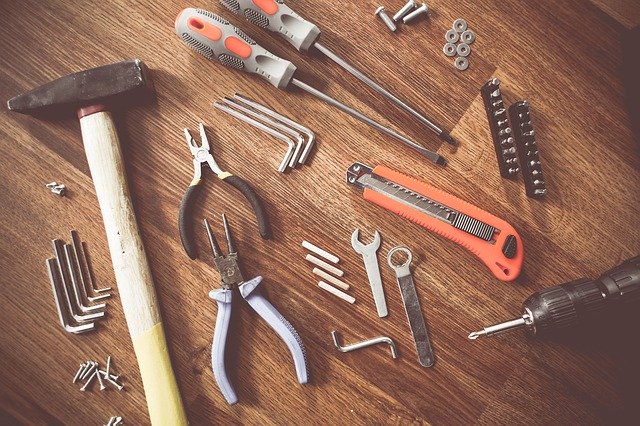
No matter what trade you happen to work in, you’ll most definitely have a preferred set of tools that you use to get a job done. For electricians, there will be some tools that you will swear by, whilst others may believe they’re not that important. However, there are a number of tools that are absolutely essential for all electricians not only to get a job done safely but effectively and to an excellent standard.
Here we provide a list of some of the essential tools for electricians and what they are used for:
- Multimeter
A multimeter measures a number of electrical properties such as voltage, current and resistance. They are available as analogue or digital devices with newer models featuring a host of sophisticated bells and whistles such as thermal imaging cameras and Bluetooth.
- Voltage Tester
Working as an electrician, it’s crucial to know whether a wire or device is ‘live’ because if you do find yourself working on something that is live, there could well be some dangerous consequences. Used for a fast safety check to ensure there is no voltage in an electrical wire or device, voltage testers absolutely vital. If available, it’s recommended to use a non-contact voltage tester as these can detect electricity without ever touching the wire or outlet.
- Wire Strippers
With a variety of holes to enable you to work with different size wires, strippers are used to cut and strip insulation from the wire. The handle of the strippers should always be comfortable to hold and easy to grip. Some wire stripper will even be made with cutting teeth so you can trim the wire ends at the same time.
- Circuit Finder
Circuit directories are not always easy to find in some homes and at times, the service panel is very rarely matched with the complementary breaker. This is where a circuit finder comes in! Simply plug the transmitter into the outlet and detector will figure out where the matching directory is. Circuit finders are also a very handy piece of equipment to trace a circuit.
- Specialised Screwdrivers and Nut Drivers
Even though they may not seem like trade-specific pieces of equipment and indeed, they’re not, as most people around the world are sure to have some form of screw or nut driver in their personal toolbox. However, there are some screw and nut drivers that have been manufactured specifically for electrical work.
Aside from specialised drivers, it’s important to make sure you always have Philips head and flathead screwdrivers with you at all times. Whether it’s removing and installing switches, outlets, cover plates or other devices, these tools will always come in handy. Be sure to have a variety of size options also, as this will keep you well-equipped for any task.
- Pliers
A good, solid pair of pliers is a must-have for any and every electrician. Handles need to be comfortable and easy to grip, that open and close is a nice, smooth manner. Having several size options again would be ideal to suit a range of tasks. Besides the traditional pair of pliers, there are others that will most definitely come in handy for any sparky. These include:
- Side-cutting and diagonal-cutting – Used to cut wires to specific lengths
- Tongue and groove – Used to remove knockouts from metal electrical boxes and tighten clamps.
- Needle-nose or long nose – Made with thin, grasping ends, these pliers make it easier to reach small spaces.
- Fish Tape
Also known as ‘draw wire’ or ‘electricians snake’, this handy tool is used to pull and push stranded or sold wire through a conduit or fishing cables across ceilings or down walls. It can be retracted and deployed when needed as it comes on a reel which always means it’s easy to grip.
- Multi-Functional Tester
Without a doubt, one of the most essential tools for an electrician, the multi-functional tester or MFT is a requirement for any electrician to ensure that any installation is correctly installed and that all test readings meet the requirements as laid out in the IET regulations.
- Battery Drill
Battery drills are used by electricians to drill holes in wood, walls or other tough surfaces and fixing screws and fasteners onto surfaces. The type of drill used will vary depending on the task-at-hand, for example, a lower-voltage cordless drill might be used when fastening work is required. Whereas for drilling into concrete, a hammer drill would be used as this provides increased impact and will drill holes at a faster rate.
- Electrical Wall Chaser
A fantastic time-saving tool, electric wall chasers are used to cut narrow grooves and channels into walls in order to install cables or a conduit. The electric motor powers electric discs similar to those found in angle grinders and some even come with a vacuum cleaner connection, allowing for great dust-free working environments.
And there you have it, the best and most essential tools for electricians! For those of you just starting out your career in the electrical industry, we hope our list of top tools can help provide you with some quality additions to your toolbox to help make your electrical work safer and much more efficient. To those of you who are considering entering the electrical industry, we can also help with our range of electrician courses! All of which guarantee the skills, knowledge and qualifications needed to embark on a successful career as an electrician.
Browse Our Electrical Courses >